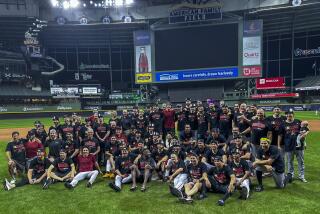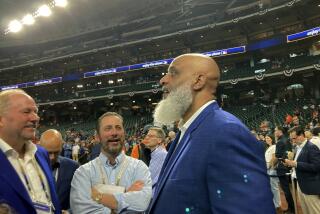Blue Jays in a Fix : Province Law Precludes Toronto From Using Replacement Players for Home Games, Unless Baseball Union Looks the Other Way
- Share via
TORONTO — After the Blue Jays postponed their Southern California tryout camps for possible replacement players last weekend because of heavy rains and flooding, one had to ask: Who could have expected a week in January in which the weather in Los Angeles would be worse than in Toronto?
But that’s the way things have been going for the Blue Jays.
As major league baseball gropes its way into an uncertain future, the Blue Jays face more questions and obstacles than any other team.
Their problems center on a 1993 law in the province of Ontario, where Toronto is located, that prohibits an employer affected by a strike or lockout from hiring replacement workers.
SkyDome is the only major league park covered by such a law, and it places the two-time defending world champions in the apparent position of accepting one of the following alternatives, none of which the team welcomes:
--Employ replacement players, but play all games on the road, substituting an alternative site, such as Vancouver, Buffalo or Washington, for home games.
--Challenge the validity of the Ontario law, in court or before the provincial Labor Relations Board. The Blue Jays could argue, for example, that they are an international business, not subject to the jurisdiction of a law applicable only in Ontario.
--Use replacements and hope that the players’ union and striking members of the team look the other way. The anti- strikebreaker law is invoked when a complaint is filed with the provincial Labor Relations Board by the union or a union member. The situation not only complicates the Blue Jays’ efforts to assemble a team but their attempts to sell season- and individual-game tickets.
General Manager Gord Ash said the Blue Jays have no interest in breaking the law or taking the province to court but added that he does not know whether the American League office might compel the team to file suit or play its home games outside Ontario.
“It’s not our intention to become the Vancouver Blue Jays or the Buffalo Blue Jays or the Washington Blue Jays, but we have to consider the possibility that we might have to play all our games on the road,” he said.
An American League spokesman declined comment, saying only that “we expect all teams to meet the obligations of the schedule,” which has not been released.
For now, Ash takes the position that the Blue Jays are looking at replacement players only for spring training games in Florida. The team already has canceled two exhibition games with the Philadelphia Phillies at SkyDome.
“We’re taking this one step at a time,” he said.
Blue Jay executives--the club is 90% owned by John Labatt Ltd., a brewing and entertainment conglomerate--have portrayed themselves as reluctant soldiers in this war since it began. Toronto was one of three teams to vote against imposition of the salary cap in December, and team officials have refrained from inflammatory rhetoric directed at players.
That might pay off if the Major League Baseball Players Assn. decides not to file a complaint against use of strike-breaking players. Eugene Orza, a top union official, said Monday that no decision has been made, but he left open that possibility.
“It very well may be that we will not object to the Blue Jays utilizing replacement players,” he said. “That is a function exclusively of the particular relationship this office has with the Toronto organization. It may be, however, that even if we do not object, the Blue Jays would still be prohibited from using replacement players.”
Ash said there has been no official communication from the players’ association to the team on the subject.
A spokesman for the Ontario Labor Minister said the government would move to enforce the law only after a complaint by the union or an individual striking ball player.
The Ontario law was adopted by the left-leaning government of Premier Bob Rae amid controversy in 1992 and took effect Jan. 1, 1993. It permits employment of replacement workers only for specific reasons, mostly linked to public health and safety. None seemingly would apply to baseball.
The law might be vulnerable to legal attack on other grounds, notably the jurisdictional issue. So far, however, despite the controversy attached to its adoption, it has gone unchallenged in court.
Meanwhile, the team has scouts looking at recent college players, the independent minor leagues and retirees in an effort to field a squad for spring training at least.
“We’ll use as many avenues as possible to try out replacement players,” Ash said, but added he has no idea how good those players might be. “There’s absolutely no question in my mind that every club will be able to field a team, but I can’t predict what the caliber of those teams might be.”
Season ticket renewal forms will be mailed this week, but buyers will be advised to postdate checks to April 1, when the team’s situation might be clearer. At that point, the team could consider refunds or revisions, if replacements rather than major leaguers are put on the field or if the Blue Jays end up playing outside Toronto. Similar provisions will be made in single game ticket sales when play begins.
With an annual attendance base in the four million range and consistent success on the field, the Blue Jays could be considered one team that prospered under the old system. They are classified a “large market” team even though metropolitan Toronto, with a population of 2.3 million, is slightly smaller than Orange County, home of the Angels, considered by baseball a “small market” team.
More to Read
Go beyond the scoreboard
Get the latest on L.A.'s teams in the daily Sports Report newsletter.
You may occasionally receive promotional content from the Los Angeles Times.










